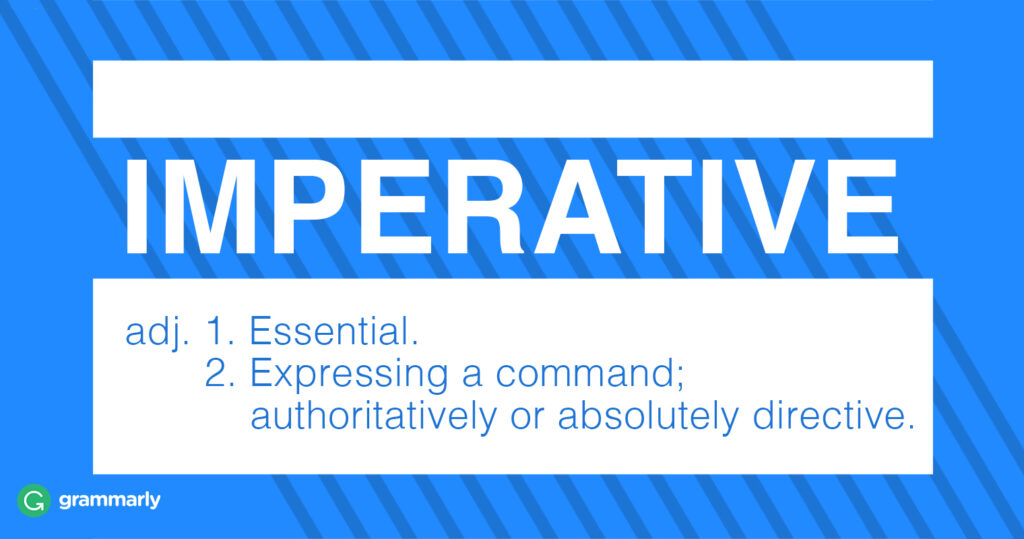What is imperative and examples?
An imperative sentence is a sentence that expresses a direct command, request, invitations, warning, or instruction. Imperative sentences do not have a subject; instead, a directive is given to an implied second person. For example, the sentence “Wash the dinner plates” commands the implied subject to wash the dishes.
How do you know if a verb is imperative?
Imperative verbs are in simple, present tense. The way a verb is being used and the sentence type will determine whether the word is an imperative verb. If the sentence is giving a command and the verb is commanding the action of the sentence, it is an imperative verb.
What is imperative sentence in simple words?
An imperative sentence is one which is used to express a command/order or request and also to give an instruction or some advice. Imperative sentences do not require a subject.
Can an imperative sentence be a question?
Interrogative Sentences. An imperative sentence typically begins with the base form of a verb and ends with a period or an exclamation point. However, it can also end with a question mark in some instances.
What is the difference between imperative and exclamatory sentences?
An imperative sentence gives a command or makes a request. It usually begins with a verb and ends with a period. The subject of an imperative sentence (you) is not shown, but it is understood. An exclamatory sentence shows strong feeling or surprise.
Which of these is an imperative sentence?
Complete answer: Don’t wait for me: This sentence is a command. Therefore, this is an imperative sentence. This is the correct option.
How do you form an imperative in English?
In English, the imperative is formed using the bare infinitive form of the verb (see English verbs for more details). This is usually also the same as the second-person present indicative form, except in the case of the verb to be, where the imperative is be while the indicative is are.
What part of speech is imperative?
Synonyms and related words singular linguisticsthe form of a verb that expresses orders. The imperative is also called the imperative mood.
What is a moral imperative meaning?
Noun. moral imperative (plural moral imperatives) (ethics) A practice, policy, or state of affairs which is required and justified by the fact that it is morally right.
What are 10 example of exclamatory sentence?
Easy Examples of Exclamatory Sentences Jeepers! You scared the life out of me! We won! This puzzle is driving me up the wall!
Which sentence is an example of an imperative mood?
The imperative mood expresses a command. Imperative Mood Examples: Please go walk the dog. Turn the music down, so I can hear the news.
Is the imperative a tense?
The imperative mood is used to demand or require that an action be performed. It is usually found only in the present tense, second person. To form the imperative mood, use the base form of the verb. Heat the water to 65°C before adding the sample.
What are the main types of grammar?
In English, there are two kinds of grammar: prescriptive grammar & descriptive grammar.
What type of sentence is I am so happy?
D. Imperative See what the community says and unlock a badge.
What are the 3 main types of sentences?
Three essential types of sentence are declarative sentences (which are statements), interrogative sentences (which are questions), and imperative sentences (which are orders).
What does an imperative sentence end with?
…verb… The final punctuation is usually a full-stop/period (.) or an exclamation mark/point (!). Imperative sentences can be in positive or negative form, and can refer to present or future time.
What are the two types of imperative sentence?
Imperative sentences can be either affirmative or negative, which means they can tell a person to either do or not do something. The two examples provided above are both affirmative imperative sentences: they’re telling someone to do something (tell or bring in these examples).
Is Thank you an imperative sentence?
‘Thank you. ‘ is a complete sentence in itself. It is an IMPERATIVE SENTENCE.
What is the symbol of imperative sentence?
An imperative sentence gives a command or makes a request. Most imperative sentences end with a period. A strong command ends with an exclamation point. An interrogative sentence asks a question and ends with a question mark.
Will you lend me your book change into imperative sentence?
Answer. Answer: Will you lend me your book?
What is negative imperative sentence?
A negative imperative uses don’t+ the simple form of a verb (eat, play, be, etc.) We use imperatives to give orders, directions and to make requests. To sound more polite, you can add the word please at the end or at the beginning of the sentence. Order. Stop talking!









